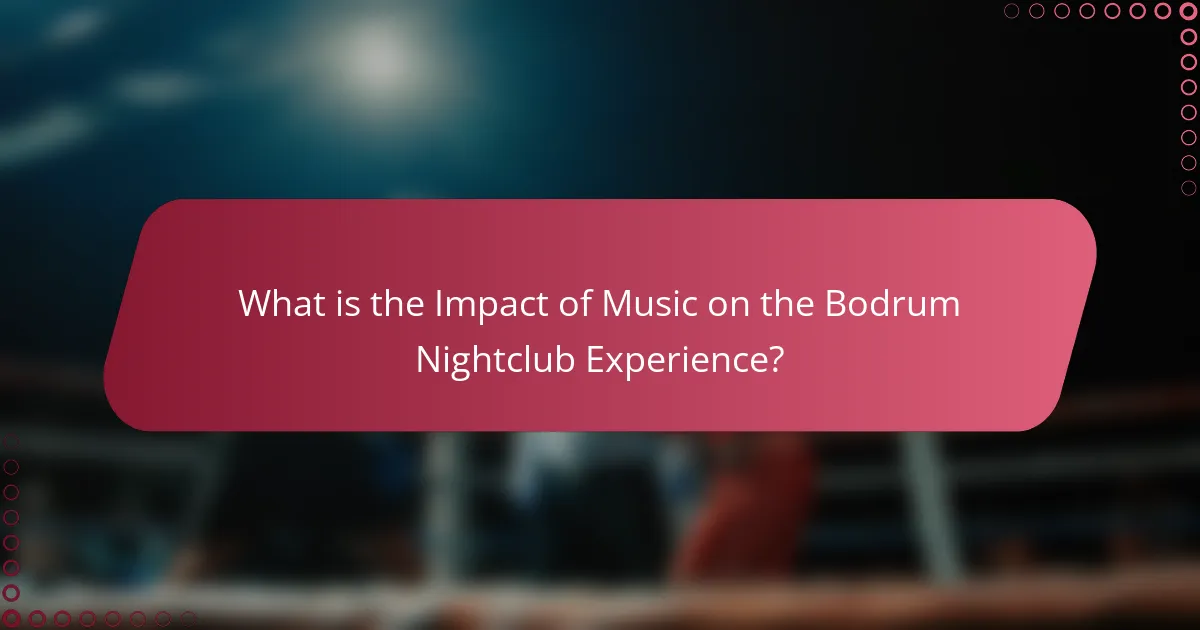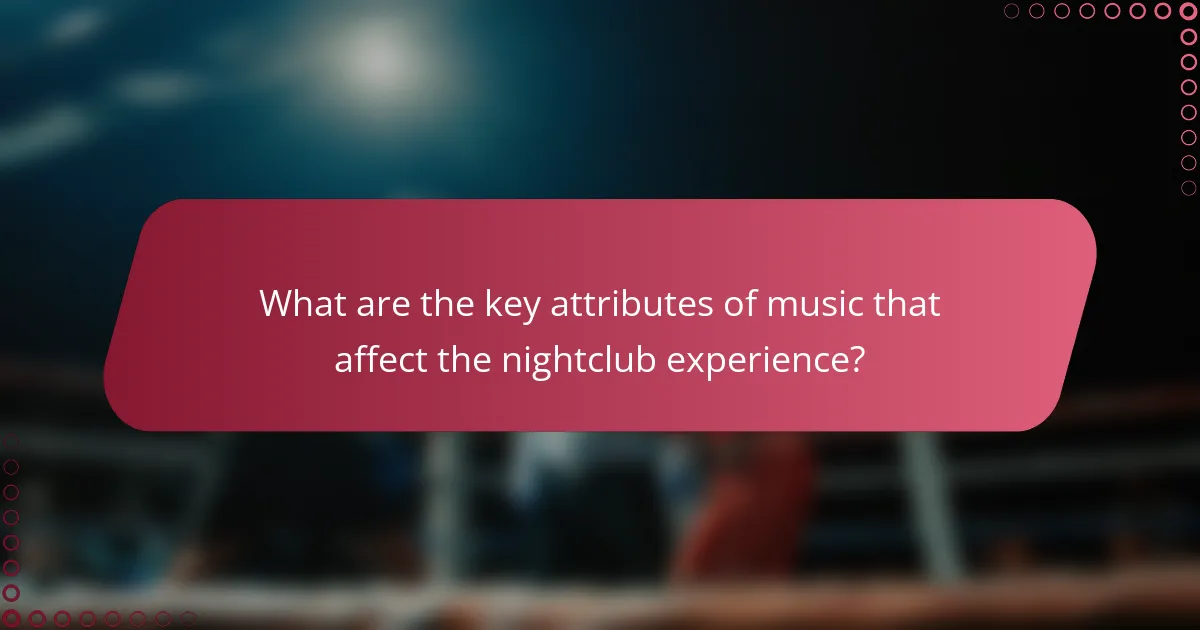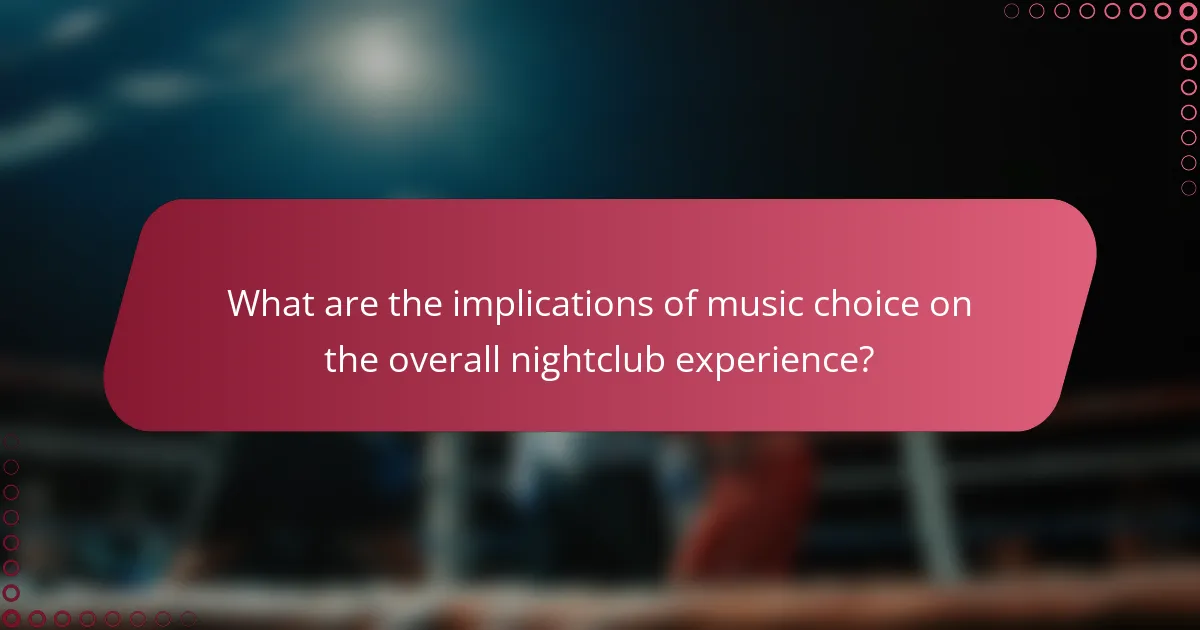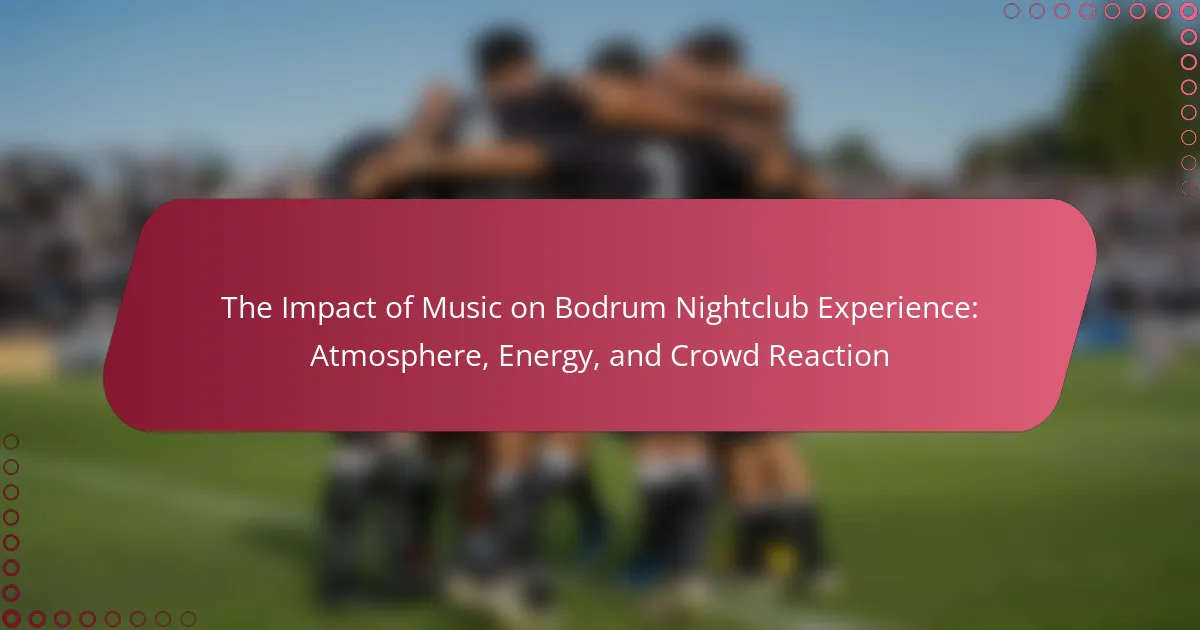The article examines the impact of music on the Bodrum nightclub experience, focusing on how music shapes atmosphere, energy levels, and crowd interaction. Key attributes such as tempo, genre, volume, and lyrical content are analyzed to understand their influence on patrons’ behavior and emotional responses. Upbeat genres like electronic dance music are highlighted for their ability to create lively environments that encourage dancing and socializing. Additionally, the article discusses how music selection is crucial for enhancing customer satisfaction and engagement, ultimately affecting the club’s brand identity and patron retention.

What is the Impact of Music on the Bodrum Nightclub Experience?
Music significantly influences the Bodrum nightclub experience. It shapes the atmosphere by creating an immersive environment. Upbeat and energetic tracks elevate the mood of club-goers. This leads to increased engagement and interaction among attendees. Studies show that music tempo affects dancing behavior and socializing. A faster tempo encourages more movement and excitement. In Bodrum, local DJs often curate playlists that resonate with the crowd. This connection enhances the overall experience and keeps patrons returning. Music also plays a role in establishing the club’s brand identity. Unique soundscapes can differentiate one venue from another.
How does music influence the atmosphere in Bodrum nightclubs?
Music significantly influences the atmosphere in Bodrum nightclubs. It sets the mood and energy level of the venue. Upbeat and lively tracks create an energetic environment. This encourages dancing and social interaction among patrons. Conversely, slower music can foster a more relaxed vibe. The choice of genre also affects crowd demographics and engagement. For instance, electronic dance music attracts a younger audience seeking high-energy experiences. Live performances can enhance the overall ambiance, making it more memorable. Ultimately, music is a core element that shapes the nightlife experience in Bodrum.
What specific elements of music contribute to the nightclub atmosphere?
The specific elements of music that contribute to the nightclub atmosphere include tempo, rhythm, bass, and melody. Tempo creates an energetic pace that encourages dancing. A faster tempo typically elevates excitement and engagement among the crowd. Rhythm adds a pulse that drives movement and syncs with the body’s natural rhythms. Bass frequencies provide a physical experience, resonating through the body and enhancing the immersive feel of the environment. Melody can evoke emotions and set the overall mood, influencing how patrons feel in the space. Together, these elements create an atmosphere that enhances the nightlife experience, fostering a sense of community and enjoyment.
How do different music genres affect the ambiance?
Different music genres significantly affect the ambiance of a space. Genres like house and techno create an energetic and vibrant atmosphere. They often encourage dancing and social interaction among the crowd. In contrast, jazz and acoustic genres promote a more relaxed and intimate setting. This can lead to quieter conversations and a more subdued energy level. Studies show that music tempo influences mood and behavior. Upbeat tempos can elevate excitement, while slower tempos can induce calmness. The choice of genre can also influence crowd demographics and engagement levels. For example, electronic dance music often attracts younger audiences looking for high-energy experiences. Overall, the genre selected plays a crucial role in shaping the overall ambiance and experience of a venue.
What role does music play in shaping energy levels within the nightclub?
Music serves as a crucial element in shaping energy levels within a nightclub. It influences the mood and behavior of patrons. Upbeat tempos and bass-heavy tracks can elevate excitement and encourage dancing. Research shows that specific genres, like electronic dance music, are particularly effective in energizing crowds. A study by North and Hargreaves (1997) found that fast-paced music increases the speed of movement on the dance floor. Additionally, music creates a shared experience that fosters social interaction among guests. The right playlist can maintain high energy, while abrupt changes can disrupt the atmosphere. Thus, music is integral to the nightclub experience, directly impacting energy levels and crowd engagement.
How does tempo and rhythm impact the crowd’s energy?
Tempo and rhythm significantly influence the crowd’s energy in a nightclub setting. Faster tempos typically elevate energy levels, prompting enthusiastic responses from attendees. Research indicates that beats per minute (BPM) above 120 can stimulate movement and excitement. Conversely, slower tempos may lead to relaxation or introspection. The rhythm’s consistency also plays a role; steady beats encourage synchronized dancing, enhancing collective energy. Additionally, changes in tempo can create dynamic shifts in mood, keeping the audience engaged. Studies show that effective tempo modulation can sustain high energy throughout an event, impacting overall crowd satisfaction.
What are the psychological effects of music on nightclub goers?
Music significantly influences the psychological state of nightclub goers. It can enhance mood, increase energy levels, and foster social connections. Upbeat and rhythmic music often leads to feelings of happiness and excitement. Research indicates that music triggers the release of dopamine, a neurotransmitter associated with pleasure. This effect can create a euphoric experience for attendees. Additionally, music can influence group dynamics, encouraging bonding among individuals. Studies have shown that a lively musical environment can reduce social anxiety. Overall, the psychological effects of music contribute to a memorable nightclub experience for patrons.
How does crowd reaction vary with different musical selections?
Crowd reaction varies significantly with different musical selections. Upbeat genres like electronic dance music typically elicit high energy and enthusiastic responses. In contrast, slower genres such as ballads may lead to more subdued reactions. Research shows that tempo and rhythm influence emotional engagement. For example, a study by North and Hargreaves (2008) found that fast-paced music increases movement and excitement among crowds. Conversely, softer music can create an intimate atmosphere, leading to quieter interactions. Ultimately, the choice of music shapes the overall mood and energy in a nightclub setting.
What factors influence crowd engagement and response to music?
Crowd engagement and response to music are influenced by several key factors. These factors include the genre of music played, which determines the mood and energy level. The tempo of the music also affects how the crowd reacts; faster tempos often lead to more energetic responses. Additionally, the volume level can enhance or diminish crowd interaction, with louder music typically encouraging more participation.
The social dynamics within the crowd play a significant role. Collective behavior often amplifies individual responses. The presence of a charismatic performer can further elevate engagement levels. Venue acoustics and layout also impact how music is perceived and enjoyed.
Research indicates that emotional connection to the music enhances crowd involvement. A study by North, Hargreaves, and O’Neill (2000) found that familiarity with songs increases audience participation. Overall, these factors interact to shape the overall nightclub experience and influence how crowds engage with music.
How do DJs and performers adapt music to enhance crowd reactions?
DJs and performers adapt music to enhance crowd reactions by reading the audience’s energy and preferences. They adjust tempo and genre based on crowd response. For instance, if the crowd shows excitement, they may increase the tempo to maintain energy. Conversely, if the energy dips, they might slow down to create a moment of reflection or build anticipation.
Performers also use mixing techniques to transition smoothly between tracks, keeping the flow uninterrupted. They often incorporate popular songs that resonate with the audience. This familiarity can elevate the crowd’s mood and engagement. Additionally, DJs may use live remixing to personalize the experience, making it unique for that specific audience.
Research indicates that music tempo significantly influences emotional responses. A study published in the Journal of Music and Emotion found that faster tempos can increase excitement and energy levels in a crowd. This supports the practice of DJs adjusting music to enhance crowd reactions effectively.

What are the key attributes of music that affect the nightclub experience?
The key attributes of music that affect the nightclub experience include tempo, genre, volume, and lyrical content. Tempo influences the energy level on the dance floor. Faster tempos often encourage more vigorous dancing. Genre sets the overall mood and style of the night. Popular genres in nightclubs include EDM, hip-hop, and house. Volume plays a crucial role in creating an immersive atmosphere. Higher volumes can enhance excitement but may also lead to discomfort if excessive. Lyrical content can evoke emotions and connect with the audience. Songs with relatable themes can enhance crowd engagement. Together, these attributes shape the overall nightclub experience, impacting how patrons feel and interact.
How do volume levels influence the nightclub atmosphere?
Volume levels significantly influence the nightclub atmosphere. High volume levels create an energetic and immersive environment. This encourages dancing and social interaction among patrons. Conversely, lower volume levels can lead to a more relaxed and intimate setting. Studies show that volume affects mood and engagement. Research indicates that music at 100-110 dB enhances excitement and participation. Patrons tend to stay longer and spend more in lively environments. Therefore, managing volume levels is crucial for optimizing the nightclub experience.
What is the relationship between sound quality and crowd enjoyment?
Sound quality directly influences crowd enjoyment at events. High-quality sound enhances clarity and richness of music. This leads to better engagement and emotional connection with the performance. Conversely, poor sound quality can cause frustration and disengagement. Research indicates that 70% of attendees cite sound quality as a key factor in their overall experience. Venues with superior sound systems often report higher crowd satisfaction levels. Therefore, sound quality is a critical element in maximizing enjoyment at nightlife events.
What types of music are most popular in Bodrum nightclubs?
Electronic dance music (EDM) is the most popular genre in Bodrum nightclubs. This genre includes subgenres like house, techno, and trance. Many nightclubs feature live DJs who play EDM tracks. These tracks create an energetic atmosphere that attracts large crowds. Additionally, pop music is also frequently played in these venues. Popular international hits resonate well with the audience. Hip-hop and R&B are gaining traction in Bodrum’s nightlife scene. The combination of these genres enhances the overall club experience.
How do cultural influences shape music selection in Bodrum?
Cultural influences significantly shape music selection in Bodrum. The city’s diverse history combines elements from Greek, Roman, and Ottoman cultures. This blend creates a unique musical landscape. Local traditions, such as folk music, play a vital role in shaping contemporary selections. Nightclubs often feature a mix of traditional and modern genres. The presence of international tourists also influences music choices. Clubs cater to various tastes, incorporating popular global hits. This eclectic mix enhances the nightlife experience in Bodrum.
What role do trends play in music choices at nightclubs?
Trends significantly influence music choices at nightclubs. Nightclubs often curate playlists that reflect current musical trends. This alignment with trends attracts larger crowds and enhances the overall experience. Popular genres, artists, and specific tracks resonate with patrons seeking a familiar atmosphere. Moreover, trends can create a sense of community among attendees. When a song is trending, it often becomes a collective experience. Research shows that familiarity with music increases enjoyment and engagement. Nightclubs that adapt to trends can enhance their reputation and maintain relevance in a competitive market.

What are the implications of music choice on the overall nightclub experience?
Music choice significantly impacts the overall nightclub experience. It influences the atmosphere, energy levels, and crowd behavior. For instance, upbeat genres like electronic dance music can create a lively environment. This encourages dancing and social interaction among patrons. Conversely, slower tempos may lead to a more relaxed vibe. Research indicates that specific music styles can enhance emotional responses. A study published in the Journal of Consumer Research found that high-energy music increases spending behavior in nightclubs. Therefore, effective music selection is crucial for maximizing customer satisfaction and engagement.
How can nightclub owners optimize music selection for better crowd experiences?
Nightclub owners can optimize music selection by analyzing crowd preferences and energy levels. Utilizing data analytics tools helps identify popular tracks and genres. Curating playlists that evolve throughout the night enhances the overall experience. Mixing various genres can cater to diverse tastes within the crowd.
Engaging with patrons through social media can provide insights into their musical preferences. Observing crowd reactions in real-time allows for adjustments to the setlist. Collaborating with skilled DJs ensures a professional flow and transitions.
Research indicates that specific BPM ranges influence crowd energy positively. A study by the University of Groningen found that music tempo significantly affects dance floor engagement. This evidence supports the strategy of selecting tracks that align with desired energy levels.
What strategies can be employed to create a memorable atmosphere through music?
Employing specific strategies can create a memorable atmosphere through music. Selecting the right genre enhances the emotional response of the crowd. For instance, upbeat electronic dance music energizes the environment and encourages dancing. Utilizing dynamic soundscapes adds depth and richness to the auditory experience. Incorporating live performances can create a unique and engaging atmosphere.
Adjusting the volume levels carefully ensures that music complements conversations without overwhelming them. Syncing music with lighting effects elevates the overall ambiance and creates a cohesive experience. Curating playlists that reflect the venue’s theme helps in establishing a distinct identity.
Research shows that music influences mood and behavior significantly. A study published in the Journal of Consumer Research found that specific tempos can increase patrons’ spending and prolong their stay. These strategies collectively enhance the nightclub experience, leaving a lasting impression on attendees.
What best practices should DJs follow to enhance the nightclub experience?
DJs should create a seamless flow of music to enhance the nightclub experience. This involves carefully selecting tracks that transition smoothly from one to another. The use of beatmatching techniques is essential for maintaining energy on the dance floor. DJs must also read the crowd’s response and adjust their set accordingly. Engaging with the audience through eye contact and interaction can elevate the overall atmosphere. Additionally, incorporating a variety of genres keeps the experience fresh and exciting. Utilizing high-quality sound equipment ensures clarity and impact of the music. Finally, DJs should prepare a diverse playlist in advance while remaining flexible to spontaneous changes. These practices collectively contribute to a memorable nightlife experience.
How can DJs read the crowd and adjust their music accordingly?
DJs can read the crowd by observing their energy levels and reactions. They notice how people respond to different songs. Body language, such as dancing or standing still, indicates engagement. Vocal reactions, like cheering or singing along, provide feedback on song choices. DJs also pay attention to the time of night and crowd demographics. This information helps them tailor their playlist. For example, high-energy tracks may be played during peak hours. Conversely, slower songs might be used to create a chill atmosphere. Research shows that crowd interaction significantly influences a DJ’s setlist decisions. This adaptability enhances the overall nightclub experience.
What are common mistakes DJs make that affect crowd engagement?
DJs often make several mistakes that negatively impact crowd engagement. One common error is failing to read the crowd’s energy. When a DJ does not adjust their set based on audience reactions, it can lead to disengagement. Another mistake is poor song selection. Playing tracks that do not resonate with the audience can diminish excitement. Additionally, DJs may overlook the importance of transitions. Abrupt changes between songs can disrupt the flow and energy of the performance.
Over-talking on the mic can also alienate the crowd. Excessive announcements can interrupt the music and frustrate attendees. Moreover, DJs sometimes neglect the venue’s acoustics. Ignoring sound quality can result in a less enjoyable experience. Lastly, not engaging with the crowd through eye contact or gestures can create a disconnect. Engagement is crucial for building a connection with the audience. These mistakes can significantly affect the overall nightclub experience.
The main entity of this article is the impact of music on the Bodrum nightclub experience. The article explores how music shapes the atmosphere, influences energy levels, and affects crowd reactions within nightclubs in Bodrum. Key elements discussed include the role of tempo, genre, and volume in creating an engaging environment, as well as the psychological effects of music on patrons. Additionally, it examines how DJs and performers adapt music selections to enhance crowd experiences and the implications of music choice on overall satisfaction.
